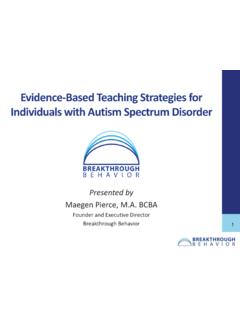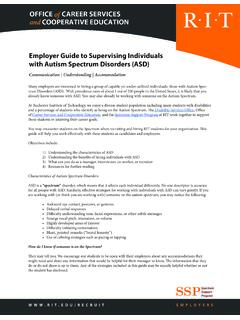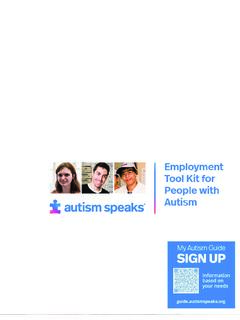Transcription of Residential Options - Autism Society of NC
1 OptionsHelping parents prepare for their child s transition to 2: Residential Options ToolkitAbout the toolkitThis toolkit is for parents and guardians of children and adults on the Autism spectrum. It is designed to help parents as they begin to prepare for their child s transition to adulthood by exploring the emotional aspects of planning for their child s future, learning about the Options available on a continuum from independent living to group living settings, and learning how to begin planning for their child s future Residential of contentsThis toolkit is broken into different sections; you can read all of it or just choose sections that most interest for your loved one s future ..3 How are you feeling?
2 Initial questions to considerTypes of Residential supportsPreparing for independent living ..6 Group living ..7 Get a list of facilitiesTour the facilitiesQuestions to askAdditional Resources ..10 Glossary ..11 Appendix: The Young Men of Marram Place ..12 Beyond the toolkitIf this toolkit raises new questions for you and you want to talk with someone about planning for your child s future, ASNC can help. In every NC county, ASNC has Autism Resource Specialists who are experienced parents of children with Autism and trained Autism educators and advocates. You can find contact information for the Autism Resource Specialist in your community here: ASNC also offers several workshops that might be helpful on topics such as guardianship, transitioning to adulthood, and Residential Options ; check the workshop schedule to see whether one is upcoming, , or ask your Autism Resource you would like to read more, please refer to the end of the toolkit for additional information sources that are recommended by the ASNC Advocacy and Bookstore staff.
3 To keep updated on the latest books and DVDs, we invite you to connect with the ASNC Bookstore on Facebook, at , or by emailing staff at to tell them you would like to join the newsletter mailing has about 50 local chapters and support groups across North Carolina, and they can be an excellent place to connect with other parents, gain encouragement, and learn from their experiences. Chapters are parent-run and offer support and education on a wide variety of topics, including Residential Options . To find one near you, please go to our website: Residential Options Toolkit Pg 3 Plan for your loved one s futureHow are you feeling?Time moves all too fast. It can feel as if you just got the diagnosis, and then the next thing you know, your child with Autism is an adult.
4 When your child is young, time can almost seem to stand still. You are so consumed with the day-to-day aspects of getting through life: school issues, therapy appointments, doctor visits, more therapy, etc. The day to day can seem overwhelming, leaving you little time for planning. Then when your child does become an adult, it can be difficult to view him or her that way. It is even more difficult emotionally to acknowledge that you as a parent will not be around forever to help your child. The future gives us one guarantee: that it will be upon us whether or not we plan for it. This can leave us with many questions. What will happen to my child when he/she becomes an adult? Where will my child live? What will he/she do?
5 How can I be sure my child is safe and well cared for? These questions lead to many emotions that we must deal with : Fear: Will he/she be safe without me? Denial: Can I really allow him/her to move out and live away from me? Guilt: If I let him/her live somewhere other than home, what will people think of me? Inadequacy: If only I had tried harder. Protectiveness: No one will take care of my loved one like I do. Sadness: What will I do without him/her here with me each day? What can we do to overcome all of these feelings as parents? One of the best things we can do is to have a plan. Many people look to their close relatives, such as siblings, aunts, or uncles, as Options for when they are no longer around. This can be a choice for some families, but not everyone has that option.
6 Even if you have an identified person to help support your loved one when you are gone, you still need to do a great deal of planning (financial, medical directives, end-of-life planning) to make sure that person carries out your wishes for your child. You will also need to think about where you would want your child to live. How will you pay for their living situation? A special needs trust, Social Security Disability, their own income? Initial questions to considerIf you have not already done so, this is a good time to sit down and realistically think about your child s strengths and needs. When at all possible, try to involve your loved one in the planning. After all, it is their life, and every person deserves to be independent to the extent that is possible for him/her.
7 What can he/she do independently? What is your child good at doing? Would your child enjoy a quiet country setting or a city life with lots to do? What are his/her likes and dislikes? If your loved one can work, how much? What type of work would your child enjoy? If you have one, a care coordinator can also be helpful in deciding what types of support your child needs. Think about assessment tools such as the Support Intensity Scale (SIS) or Special Needs Assessment Profile (NC-SNAP) levels that are often used to determine level of need for individuals with disabilities. (To see the NC-SNAP, go online to )Initial steps: What are my child s strengths and needs? How much care/support does my child need on a daily basis?
8 Make a decision based on your answers and then make a plan to get there. Pg 4: Residential Options Toolkit Does your child need full-time care with 24-hour supervision or can he/she live a more independent life with check-in supports? Does he/she have medical or behavioral needs that require more supervision? Can the individual live with others or does he/she need a private setting or private room? Does the individual need to participate in a vocational supported employment program or a structured day program setting? If the individual works, what type of transportation will be provided or available?Once you have determined what would be the optimal living option, set about to develop a plan to get there. If your child is going to live independently or semi-independently with supports, what are the life skills they will need to make that a reality?
9 Think of cooking, cleaning, taking medications correctly, paying bills, and daily hygiene. If your child wishes to live semi-independently, does he/she have funds available to pay for rent, utilities, food, and other essentials? If not, check with your managed-care organization (MCO) and local Department of Social Services about funding sources such as the NC Innovations Waiver, Medicaid, Social Security Disability Insurance (SSDI), or Supplemental Security Income (SSI). What would be the funding stream for your child if he/she is going to live in a group setting? You will need to connect with your MCO to learn more about facility Options . Wait lists can be long, so don t you want your child with Autism Spectrum Disorder (ASD) to live independently with limited supports or in a more structured supervised setting, it is never too soon to begin planning.
10 Types of Residential supportsGroup livingIntermediate Care Facility for individuals with Developmental Disabilities (ICF/IDD): This type of setting would be geared toward a person diagnosed with a developmental disability who has a high level of need and would need staff present 24 hours per day to assure safety and to provide habilitative care and training. They provide 24/7 staff levels that meet the needs of the individual and a multi-disciplinary team of professionals is available for consultation and support to the individual and staff. In addition to personal care and habilitative supports, an ICF must provide specialized therapies as needed and an active treatment plan at all times. ICFs must follow state and federal guidelines.







